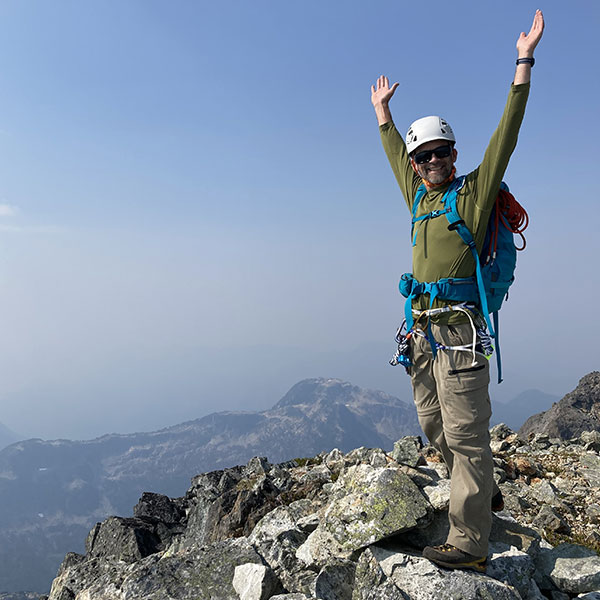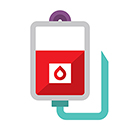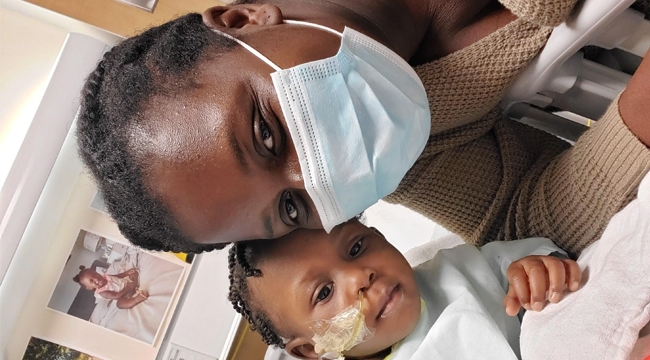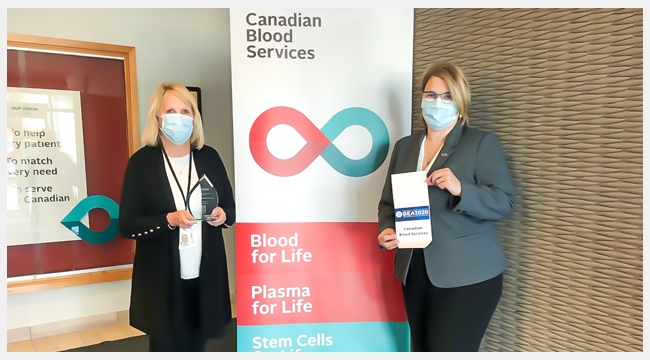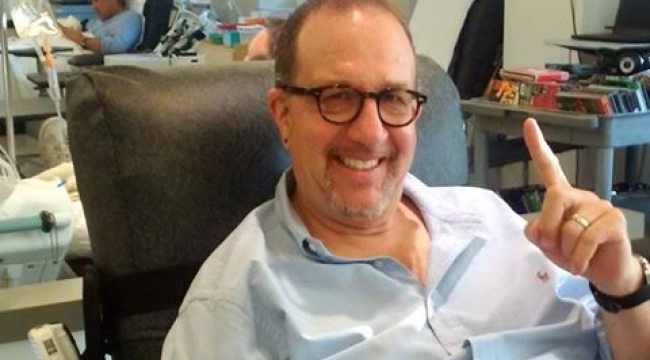This bear attack survivor knows what he’d say to his blood donors
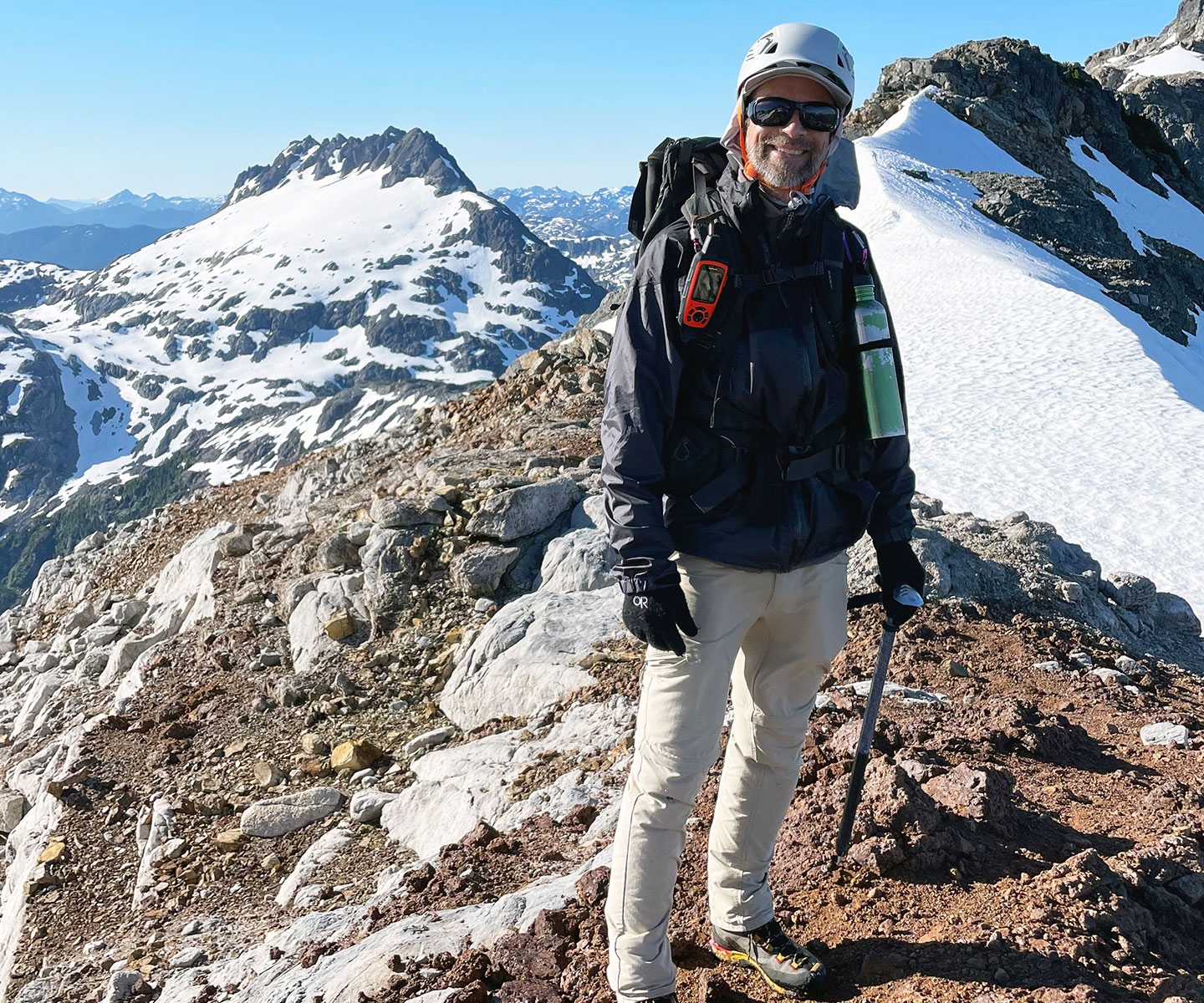
O-negative red blood cells delivered by air ambulance made all the difference for Colin Dowler
After surviving a grizzly bear attack four years ago, Colin Dowler had hoped to give back by donating blood. Instead, after learning earlier this year that he’s ineligible, he’s sharing his incredible story to inspire others to do it.
O-negative blood donors have a starring role in that story, as their donations were on board the air ambulance that came to Colin’s aid on July 29, 2019. The helicopter touched down at the logging camp where Colin had “crash-landed” his mountain bike about 70 minutes prior, in a remote area of B.C. northwest of Powell River. After the grizzly attack, he had somehow pedalled seven kilometres to get there, with just one functioning leg and massive injuries to his torso. The bear had already begun eating him alive when he escaped.
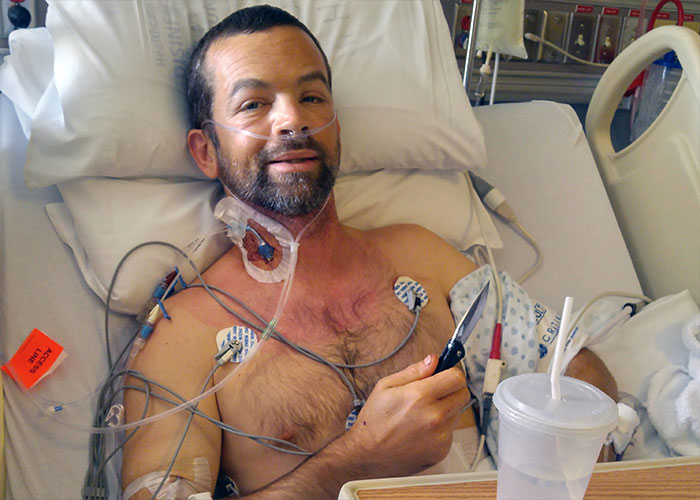
Conscious throughout, Colin vividly recalls the sound of the arriving helicopter — music to his ears — and the conversation with one of the paramedics.
“I remember him telling me, ‘You’re lucky, we’ve only just recently been able to transfuse blood on the scene. Without this blood, your odds of surviving the trip back to the hospital would be slim,’” recalls Colin, 49. “And I remember thinking, ‘Man, I’m going to live. Because you wouldn’t tell a dying man that.’”
They transfused the bags in quick succession, he says, with “a logger working as an IV pole.”
“I remember them joking to one of the loggers, ‘You did such a good job holding that bag! Here, hold this one,’” Colin says.
He’ll never know who donated those crucial O-negative red blood cells, which stabilized him for the trip to Vancouver General Hospital. They could have been neighbours in B.C. or blood donors across the country. Given the 42-day shelf life of red blood cells, they would have donated blood in late June or sometime in July. Maybe they cut short a barbecue or a trip to the beach to help a stranger.
Whoever they are, Colin is so grateful. And he knows exactly what he’d say if he could meet them.
“I’d tell them thank you. And I’d offer to take them fishing.”
NOTE: Some readers may find details of Colin’s attack upsetting. You can click here to skip ahead.
‘I’m suspended in the air, hanging from his jaws’
Colin’s journey had started the day before, near his home in Campbell River, B.C., a small city on the east coast of Vancouver Island. He’d set out by boat for a remote area of the mainland near Mount Doogie Dowler. The peak, named after Colin’s late grandfather, is about 55 kilometres as the crow flies from Campbell River. Colin and his brother had set a goal to climb it in the next few years.
This was Colin’s second mission to scout out possible routes toward the top. He docked his boat at a small logging camp (the same one he’d crash into later), where a cook offered him a lift to the end of a logging road. From there, he continued on his own with his gear and bike, trekking along older roads and through the bush, before spending the night partway up the mountain near the tree line.
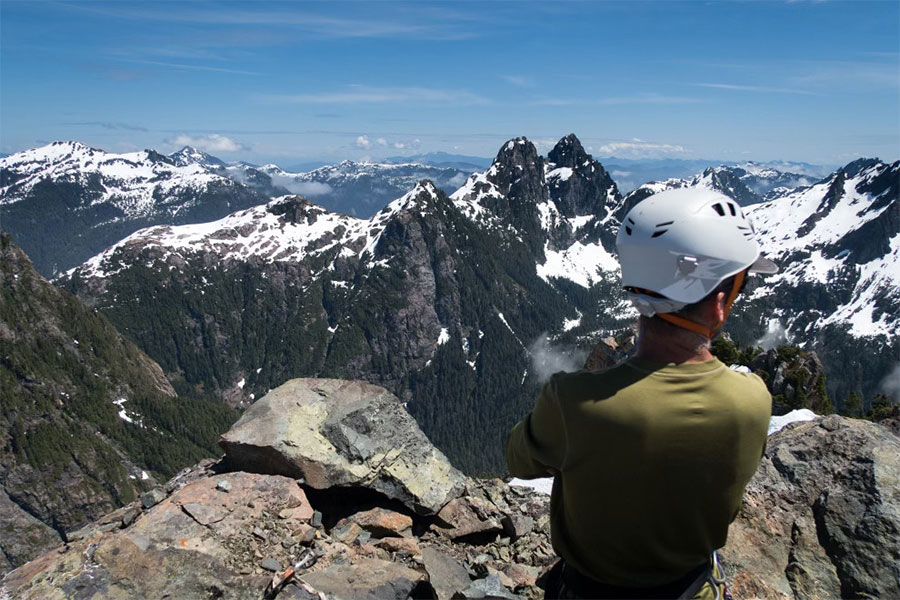
The next day, he’d logged just a couple of kilometres of the return trip when the bear appeared in front of his bike.
“It was a relatively flat stretch on my way back to the ocean,” Colin recalls. “I was looking at the views, and then I looked ahead and went, ‘Holy smokes, there’s a grizzly bear right on the road.’”
He reckons the animal was no more than 30 metres away. Knowing he couldn’t possibly outrace it, he stood his ground, hoping it would step back into the bush. Instead, it ambled toward him. Colin grabbed a hiking pole off his backpack.
“I banged the pole on my bike a bunch, to make some noise in the hope that would deter it,” Colin says. “It didn’t.”
The bear continued past him a few feet — coming so close he could have touched it, Colin recalls. Then it turned around. Colin spun, too, to keep the bike between them. That seemed to make the bear nervous.
Colin then nudged it between the eyes with his hiking pole, hoping to push it back. But the grizzly grabbed the pole with its teeth, dropped it, and began prodding the bike.
“So I took my pack off in the hope it would go for the food in the pack,” Colin says. “I threw it sort of in between us, but a bit to the side.”
The bear sniffed the pack for just a moment before turning back to Colin. In desperation, Colin flung his bike at it. Next thing he knew, the bear’s arm was coming at him through the bike frame, followed by its head over the top. It plunged its teeth into Colin’s side and pulled him up.
“I’m suspended in the air, hanging from his jaws,” says Colin. “He dragged me down the road 30 or 40 feet, then put me down at the end of the road and cinched up his bite.”
He gouged at the bear’s eyes with his fingers and fought frantically with his legs.
“I’m on my shoulders and my back, trying to bicycle-kick like crazy to get him off me,” Colin says, “and he’s corralling my legs with his paw, and just chomping into both of my thighs. He put over 50 puncture wounds in my thighs.”
As he howled in pain, many thoughts also rushed through Colin’s mind. He wondered if he’d be eaten alive or dragged off into the bush and left to die. He was filled with remorse for abandoning his wife and two daughters.
Then he remembered: he had a knife.
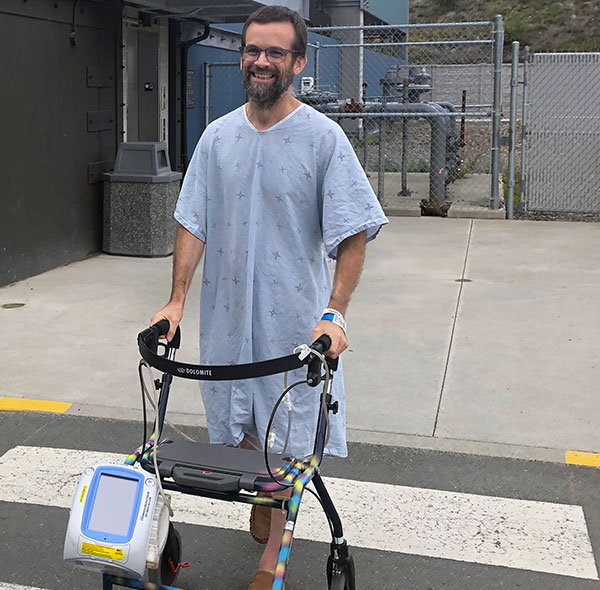
A lucky gift
The buck knife was new, a gift from his dad just a few weeks earlier. While not designed to fight a grizzly bear, it was much better suited to the task than the pocketknife Colin usually carried.
With the 350-pound bear pinning him to the ground, Colin managed to get a hand into his right pocket. He pulled out the knife and plunged it into the animal’s neck.
It worked. The bear got off him. It wandered back up the road, trailing blood. It sniffed at Colin’s bike, then walked back toward the trail it had stepped out of.
“He’s standing there, bleeding out of his neck. Looking at me, looking back at the bush, back at me.”
Colin forced himself to look away from the bear to attend to his injuries. He used the knife to cut off one of his sleeves to make a tourniquet for his left leg. With the extensive wounds, applying it was a gruesome task. But when he looked back up, the bear was gone.
Then he thought about what to do next. With no way to communicate with the outside world, he knew he had to get back to the logging camp.
“I couldn’t walk. I couldn’t crawl. So I flipped around to my butt, kicked with my one good leg and pushed with my hands to get the 40 feet or so back to my bike,” Colin says. “It was pretty hard to get on, and when I tried to pedal, I face-planted.”
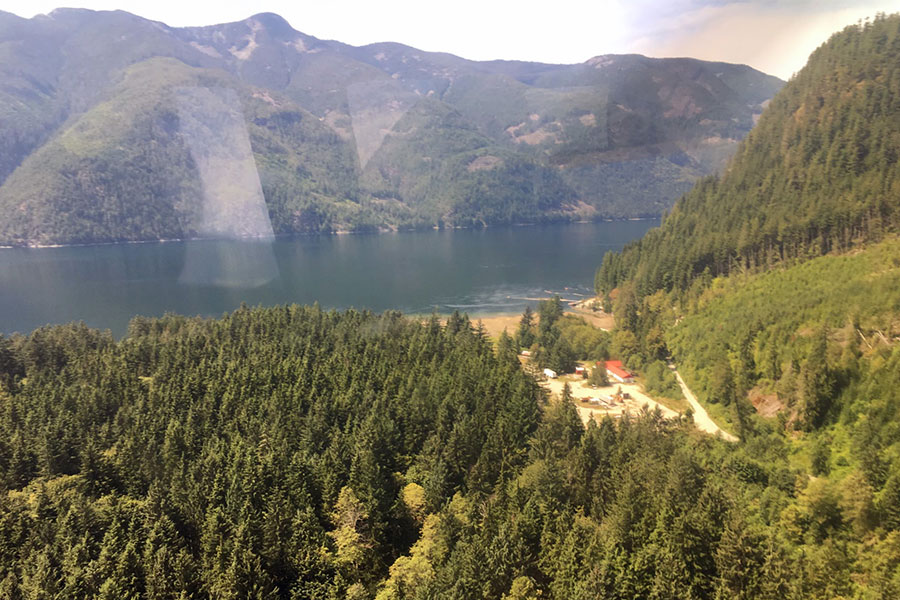
After managing to re-mount, he focused hard and took off. He covered the first 3.5 kilometres by pumping his right foot, with his injured left one as dead weight on the other pedal. For the second half of the journey he was able to coast before crashing into the deck of a building at the logging camp.
Fortunately it was lunchtime and several employees were inside.
“I just screamed, ‘Help! I’ve been mauled by a bear! Call a helicopter!’ Colin says. “They came running out. They were looking at a massacre, blood all over.”
Blood donors an essential part of a lifesaving team
Colin is so grateful for the way those five people swung into action. They quickly used a satellite phone to call for help and worked together to get him inside the building.
“That’s where we found Colin, being tended to by first aiders who had just taken their first aid course the week before,” says Kalani Polson, one of the critical care flight paramedics who arrived by helicopter. “So he was their very first patient.”
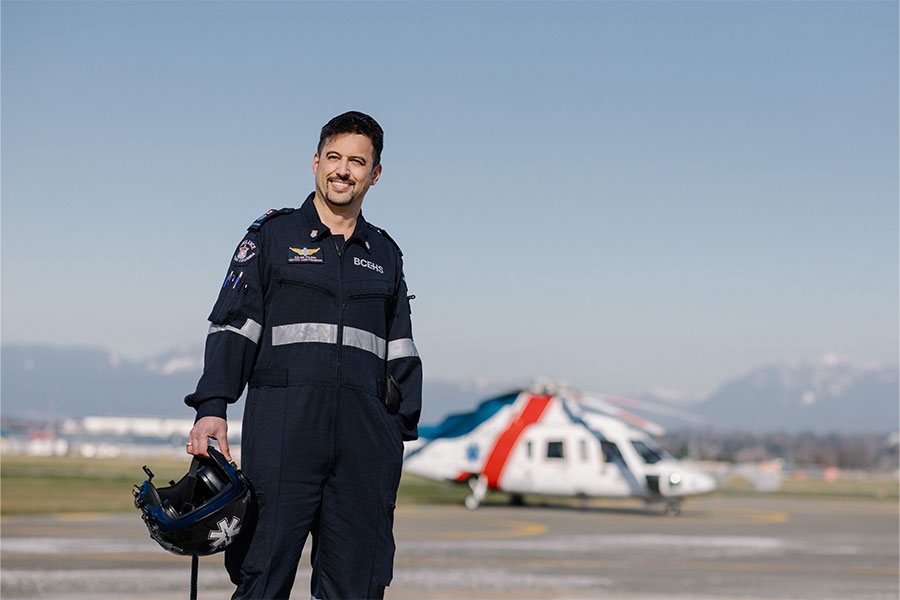
It was a first for Kalani as well. He’d transported bear attack victims from smaller hospitals to major ones, but he’d never been first on scene for such an incident.
Lifting one of the dressings the first aiders had applied to Colin, “You could see his kidney, you could see his adrenal gland,” Kalani says. “It was about a six-inch-by-six-inch opening on the side of his abdomen. We were concerned that he could bleed out and die of hemorrhagic shock at any moment.”
Colin was indeed lucky that BC Emergency Health Services (BCEHS) had launched its Prehospital Blood Program early that year. The program stocked air ambulances at the Vancouver base with O-negative blood, in temperature-controlled coolers. The first patient had been transfused in February.
“We had only done a few transfusions between February and that summer,” Kalani says. “Typically, summer is our busy season. So Colin was probably one of our first dozen patients.”
Since 2019, that “blood on board” program has expanded to air ambulance bases in Parksville and Kamloops. In 2021, in addition to red blood cells, the air ambulances in Vancouver also began carrying thawed plasma — the straw-coloured component of blood that makes up most of its volume. By early July 2023, paramedics in all locations had delivered 118 transfusions in total, according to BCEHS.
“There’s quite a number of patients that are alive today who would not be alive, had it not been for prehospital transfusion,” says Kalani, who is now a unit chief at the Vancouver air ambulance base. “It’s the single biggest lifesaving measure that I’ve seen introduced, and this is my 28th year as a paramedic in B.C.”
Without blood, Colin likely wouldn’t have even made it to the helicopter, let alone the hospital, says Kalani. But those O-negative blood donations, with some medication to help prevent further blood loss, stablilized him for the hour-long flight to Vancouver.
Kalani has a message for those on the fence about donating blood, including during his busy summer season.
“I would say that it’s liquid gold,” he says, “Their donations can and will save lives.”
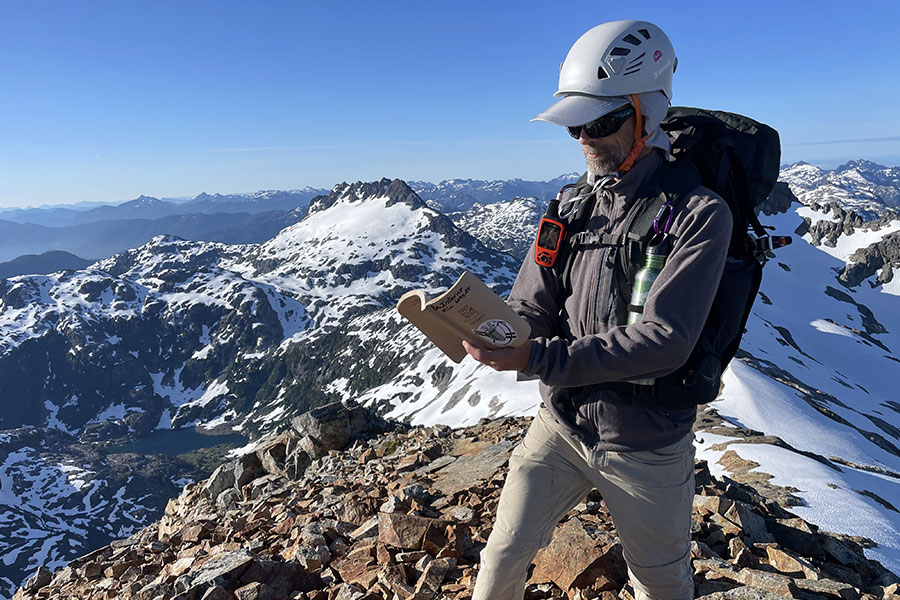
A blood recipient embraces new challenges
The blood donations Colin received have made an impact well beyond him. He’s able to be there for his wife and two daughters, the youngest of whom had not yet finished high school when he was injured.
And he’s inspired many others as well. While isolating during the pandemic, he planned a team for Royal LePage Snow to Surf, an adventure relay race on Vancouver Island. The race starts in the alpine and ends at the sea, with participants skiing, biking, running and paddling toward the finish. Like Colin, his teammates had overcome serious injury and illness.
“Our team was named “The Strugglers” to highlight the adversity we have overcome as individuals and to honour all others facing challenges as we all do,” Colin wrote in a submission to a local newspaper. “Life is a challenge, and we struggle on.”
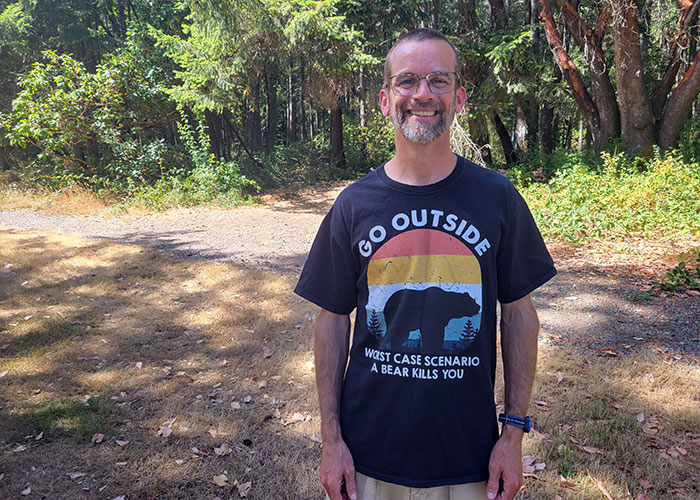
His near-death experience in the jaws of a grizzly hasn’t kept Colin out of the backcountry, either. He’s determined to hike, camp and explore as much as he can now, in case health problems related to the attack make it impossible later.
In fact, this year, Colin spent Canada Day weekend hiking and camping in the mountains of Strathcona Park on Vancouver Island — albeit with a bit of gear he didn’t used to keep so close overnight.
“I definitely sleep better in a tent with pepper spray in it,” says Colin. “Pepper spray is kind of like my security blanket.”
